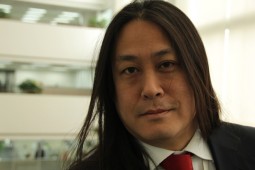Looking back at its own history is not popular in China, notes
author Zhang Lijia
on her website. She welcomes the apologies of a growing number of former
Red Guards who committed violence during the
Cultural Revolution. Soul-searching is needed to avoid another Cultural Revolution, she argues.
Zhang Lijia:
The internet has been alive lately with the news that Chen Xiaolu, the son of Marshal Chen Yi, made a public apology to the teachers he had attacked during the Cultural Revolution. I was talking about the news with two American visitors as I showed them around the National Museum of China, just off Tiananmen Square. Tucked away in a corner we noticed that this major historical event is represented by one photo – Mao Zedong receiving the Red Guards – and a one-sentence caption: "A catastrophe mistakenly launched by the leaders."
On October 7, 57-year-old Chen, together with some former Red Guards classmates, visited Beijing No 8 High School and apologised to the teachers who had been labelled "supporters of capitalism". He expressed remorse for causing their suffering. In August, Mr Chen, who worked as a political adviser, also published a formal apology in the school’s alumni blog in which he claimed responsibility for sending some staff and fellow students to labour camps.
It is encouraging to see a string of individual confessions in recent years. Just in June, a 61-year-old retired official, Liu Boqin, paid for an advertisement in the magazine Yanhuang Chunqiu to apologise for the violence he had committed as a 14-year-old. "The chaos of the Cultural Revolution was not an excuse for my evil deeds," read the apology.
Earlier this year, a 60-year-old lawyer, Zhang Hongbing, fought a legal battle in a bid to preserve his mother’s tomb in their hometown in the central province of Anhui . Her public humiliation and execution was the result of his own denunciation of her.
In May 2010, another 60-year-old, Wang Jiyu, haunted by guilt, confessed in the same magazine that as a quick-tempered 16-year-old, he had killed another teenager from a rival Red Guards group.
There are quite a few similar cases. But Chen’s case has drawn the widest attention thanks to his family background: his father was one of the 10 marshals who led the revolution.
To apologise, especially in such an open fashion, is uncommon in Chinese culture. So why has this new trend emerged? As Chen explained in his apology, his victims were getting old and if he hadn’t taken action, it might have been too late. As they reached their autumn years, these former activists began to reflect on their painful past.
Most web users applauded Chen’s courage and honesty. Some saw this trend as a sign of the awakening of the nation’s consciousness and encouraged other perpetrators to come forward and apologise. Others even go as far as urging the government to do the same: to reflect on the Cultural Revolution and make a public apology to the Chinese people.
Responding to this call, the government-run Global Times newspaper published an editorial which argued that the time for the whole nation to reflect on the era has passed, as there are more urgent issues to deal with.
Really? I don’t think so. The authorities have not confronted the traumatic episode. After the official "catastrophe" verdict in 1981, the government urged people to forget it for fear that this dark page might damage its reputation and threaten its legitimacy. There is no official museum to commemorate it; books on the excesses of violence during the period are banned; and textbooks, like museums, gloss over it.
Last March, the outgoing premier, Wen Jiabao , warned that the historical tragedy could repeat itself. The shot was aimed at Bo Xilai , the now disgraced politician who had launched campaigns in Chongqing that resembled some aspects of the Cultural Revolution.
Wen certainly had reasons to worry. The negative impact of the movement is still lingering. The so-called strike-hard campaign, for example, where criminals got speedy and heavy sentencing, is essentially the Cultural Revolution in its style.
If the authorities allowed large-scale and open discussion, young people would understand what happened exactly and could draw lessons from it.
A thorough reflection on the Cultural Revolution would likely lead to discussion of the mechanism to prevent such tragedy, which means the introduction of the rule of law and de-centralisation of power. These are things our leaders are probably not ready to grant to the people.
Without true reflection, China will miss a good opportunity to heal properly, to purify its soul and to grow stronger. That’s the only way to prevent the ghost of the Cultural Revolution from haunting the country ever again.
The article was first published at the South China Morning Post and
can be found at Zhang Lijia's website.
Zhang Lijia is a speaker at the China Speakers Bureau. Do you need her at your meeting or conference? Do get in touch or fill in our speakers' request form.
China Weekly Hangout
How successful can president
Xi Jinping be in rooting out
corruption, the
+China Weekly Hangout is going to ask on Thursday 31 October. How committed is the Xi/Li team to real change?
You can read our announcement here, or
register for the event here.
Is the Occupy Central going to make a difference in Hong Kong? How eager are the Hong Kong people to get one-person, one-vote. CSR expert
+Brian Ho answered the questions by
+Fons Tuinstra of the
China Speakers Bureau July 11.



















